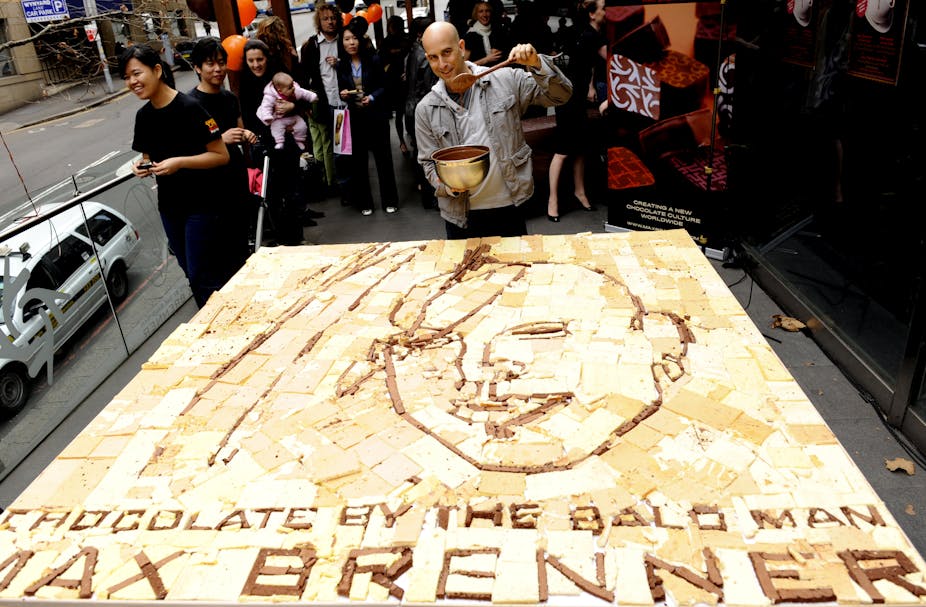The Boycott, Divestment and Sanctions (BDS) movement against Israel is controversial on at least two levels. First, it targets businesses, which some (including the Victorian Government) see as an illegitimate means of political protest. Secondly, it targets Israel, which some see as inherently anti-Jewish.
This is not an article about the merits of the BDS movement. It is an article about eleven BDS demonstrators who were arrested in Melbourne on July 1 last year for protesting outside a Max Brenner’s Chocolate Bar in the QV Square shopping space. They were charged with the delightfully archaic-sounding offences of “besetting premises” and “wilful trespass in a public place.” It is also an article about the right to protest and the public/private divide.
On Monday, Magistrate Garnett of the Magistrates’ Court of Victoria dismissed the case against the 11 protestors. According to his judgment, private corporations own QV Square and the laneways around it, but they are bound by an agreement with Melbourne City Council to allow 24/7 public access, with very limited exceptions. This makes it legally a “public place,” and means the owners did not have authority to put conditions on the protestors’ entry, nor to have them removed for failing to comply with those conditions. Yet in the weeks leading up to the July 1 protest (which had been flagged on social media), the business owners had a number of meetings with Victoria Police to explore their options for doing just that.
On July 1, 132 police officers (including special Public Order teams) blocked QV Square and shut down the protest. 16 demonstrators were eventually charged with besetting and trespass; five faced additional charges relating to resisting arrest.
After 17 days of evidence involving no fewer than 26 police witnesses (compared with only four civilian witnesses), the Court found that the 11 had no case to answer. It found that in fact the police were more to blame for blocking public access (which is effectively what “besetting” a business means) to QV than the protestors.
The arguments over the trespass charges were complicated, but suffice it to say that, if the prosecution had had its way, it would be “wilful trespass” to enter a public place with the intention of voicing political views, if it interfered with the rights of others to perform “normal activities”. The court found this interpretation would be contrary to the Victorian Charter of Human Rights and Responsibilities, which only allows for limitations on freedoms of speech and assembly where there is a genuine need – for example where there is a serious threat to public order or safety. The Magistrate noted that customers had continued to eat at Max Brenner’s throughout the protest, and were not prevented from leaving. He concluded that, “[w]hilst the actions of the protestors may have caused some inconvenience to members of the public, the nature and extent of it was not such as to warrant a prohibition of their right to demonstrate and express their political opinions”.
Although not reflected in the decision, it seems clear that the protestors’ disruption to trading within the QV precinct was what the business owners and police found particularly repugnant. This was certainly the case put forward by the Lord Mayor of Melbourne for breaking up the Occupy protests late last year, and is the reason the Victorian Government called on the ACCC to investigate the BDS protests.
Now that the criminal law, along with the Charter, has proven to be on the protestors’ side, the Victorian Government has promised to investigate “whether tougher legislation is needed to prevent political protests closing down businesses”.
Although the protestors have been accused of targeting Max Brenner’s shops simply for being an Israeli-owned business, there are in fact allegations that the its parent company supports certain controversial brigades of the Israeli Army by sending them free food. These brigades have been criticised in a UN report in relation to the invasion of Gaza in 2009.
Whether or not these allegations are true, the law is not meant to shut down peaceful political protests. For those who are sceptical about the peaceful nature of the protest, or who are just interested to see what it looked like, there is footage on Youtube.
The highest court in the land agrees with the protestors’ lawyer Rob Stary when he says that freedom of speech, particularly on political matters, is essential to the maintenance of our democracy. The law recognises that there needs to be some limitations on this freedom – that is why acts such as incitement to violence are prohibited. However, while the right to make an honest dollar is inherent in our market‑based economic and societal structures, it is not the sort of right which displaces our fundamental human rights when they are exercised in public places.
This case could set an important precedent for the right to protest peacefully in Australia. Admittedly, the fact that QV Square is legally a public place and that Victoria has a Charter of Rights played a role in the decision. If, for example, a similar protest were to be held at a Max Brenner’s inside a Westfield mall in NSW, neither of these factors would be in play. Nevertheless, this victory in court over corporate interests and public authorities who cooperated to silence a legitimate expression of free speech is legally important and powerfully symbolic.

